What does the passage of the One Big Beautiful Bill Act (OBBBA) mean for your organization? Here’s a summary of the key provisions affecting exempt organizations:
 Eleanor Livingston, CPA, MSTNonprofit Tax Director[email protected]
Eleanor Livingston, CPA, MSTNonprofit Tax Director[email protected]
Executive Compensation Excise Tax
The excise tax imposed on exempt organizations that pay more than $1 million in remuneration to an employee or make excess parachute payments has been expanded to cover any employee receiving either of the above. Prior to the passage of OBBBA, the excise tax only applied to “covered employees,” which was defined as the five highest compensated employees in any taxable year beginning after December 31, 2016. This change is effective for tax years beginning after December 31, 2025.College and University Endowment Tax
The bill expanded the previous 1.4% excise tax on certain private colleges and universities that have at least 500 tuition-paying students and at least $500,000 per student in assets. Now there is a three-tiered structure based on the institution’s student-adjusted endowment (SAE):- SAE between $500,000 and $750,000: 1.4%
- SAE between $750,000 and $2,000,000: 4%
- SAE above $2,000,000: 8%
From a Development Perspective
Individual taxpayers who do not itemize can deduct $1,000 ($2,000 on joint returns) for cash contributions to qualifying charities. For itemizing taxpayers, the Act creates a 0.5% floor on charitable contributions and permits disallowed charitable deductions to be carried forward only to the extent they exceed this 0.5% threshold. Also, for scholarship-granting organizations, starting in 2027, a new tax credit of up to $1,700 will be allowed for cash donations used to fund scholarships for qualified elementary or secondary education expenses. On the corporate front, charitable contributions need to exceed 1% of taxable income to be deductible, with the same 10% cap on contributions that has been in place for years. Excess contributions can be carried forward for five years.Change in 1099 Reporting Threshold
Starting in 2026, the threshold for the requirement to file a Form 1099-NEC, Nonemployee Compensation, or Form 1099-MISC, Miscellaneous Information, will rise from $600 to $2,000 for payments made to contractors, vendors, and service providers during the year. The threshold will be indexed for inflation beginning in 2027.Changes Impacting Employers and Employees, Including Exempt Organizations
- The inclusion of student loan repayment as part of an educational assistance program was made permanent. This allows employers to provide employees with up to $5,250 per year in tax-free educational assistance, which can be for tuition or loan repayment funds. The amount will be indexed for inflation starting in 2026.
- For plan years beginning after January 1, 2026, FSAs for dependent care will have new limits, increasing from $2,500 to $3,750 for individuals and from $5,000 to $7,500 for married couples filing jointly.
What Didn’t Make it to the Final Bill
The following provisions did not make it into the final bill:- The increase in the tax rate on private foundations’ net investment income
- The changes to the excess business holdings rules for private foundations
- Expansion of the definition of “unrelated business taxable income” to include certain types of income from the sale or licensing of an organization’s name/logo, amounts paid or incurred for qualified transportation fringe/parking facilities, and certain research income
- Allowing the Treasury Secretary to suspend the tax-exempt status of organizations designated by the Secretary as “terrorist supporting organizations”
Other Indirect Impacts
Nonprofits may struggle to meet the increased demand for services due to cuts to their funding. The various reductions to Medicare and SNAP benefits could create additional burdens on nonprofits that provide healthcare, food assistance, and help with other basic needs. For more information or questions about this article or to find out how Windes can assist, please contact our Nonprofit Team at [email protected]. This article was written by Windes Nonprofit Tax Director Eleanor Livingston. Eleanor Livingston, CPA, MSTNonprofit Tax Director[email protected]
Eleanor Livingston, CPA, MSTNonprofit Tax Director[email protected]


